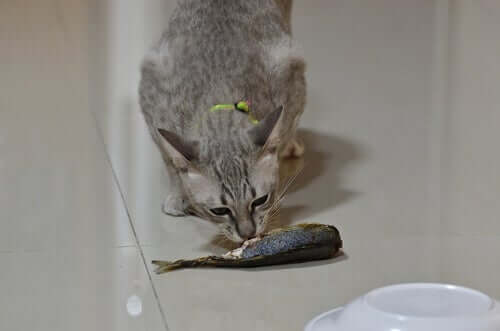Should You Be Feeding Fish to Your Pets?

Today we’ll be talking about a type of meat that’s usually harmless to your pet. However, you should keep in mind that feeding fish to your pets is only good to a certain extent.
We humans eat a lot of things that are bad for us, despite often knowing it perfectly well. However, we need to make responsible decisions for animals that can’t make decisions for themselves.
These days when nearly everything is supposedly toxic for our pets there is much talk about whether we should feed fish to them. While eating fish does provide a lot of nutrients to our furry ones, some claim that fish is less than ideal for these animals.
So, let’s review the benefits and disadvantages of feeding fish to our pets.
Feeding fish to your cat

Generally, fish is a source of protein and many other nutrients that are essential to the correct functioning of an animal’s internal organs. For example, bluefish contain Omega-3 fatty acids. This type of acids is responsible for the shine and softness in the fur of a cat.
This type of fish also provides a large dose of energy. Bluefish are the best kind of meat you can include in your pet’s diet, due to their fat content and high content in Omega 3.
In contrast, there are some types of fish that block the absorption of essential vitamins in the body system of cats. In addition, they may not provide vitamin A, which is also essential to them.
As if that wasn’t enough, a high fish intake could lead to thyroid problems, vitamin deficiency, and allergies. So, as with everything, a varied, balanced diet is essential. In conclusion, fish is good for your animals but it shouldn’t be the only thing they eat.
There are some types of fish that we consume that aren’t ideal for our pets. For instance, it’s not a good idea to give them:
- Salted fish
- Canned seafood
- Smoked fish
- Marinated fish
In short, don’t feed processed fish to your cat; they should eat it raw and, if possible, it should be fresh that day.
Feeding fish to your dog

Just like with cats, dogs can also eat fish as long as it’s a part of a balanced and varied diet. Fish is, in fact, an excellent choice for your dog. The fat content of fish is quite favorable for a dog’s health because it’s a great source of all sorts of nutrients, as we mentioned above.
The Omega 3 present in fish is great for their bones and joints and its consumption is a good way to prevent diseases such as arthritis or osteoporosis.
It is a proven fact that eating fish is also an excellent option to include in a dog’s diet, especially when they need to lose weight. In these cases, salmon is the best choice due to its low fat content.
In addition, fish is an ideal food when it comes to providing strength and energy to older dogs. As if that wasn’t enough, the anti-inflammatory and antioxidant properties of fish help treat dermatological problems in dogs.
Just as with cats, dogs should eat the fish raw and stay away from processed commercial products. Keep in mind that an excess of fish in a dog’s diet could lead to health problems.
On this note, if a dog shows any possible allergy symptoms after consuming fish, change the source of the fish and try again with a smaller piece. If the allergies persist, they may be allergic to fish altogether. Do consult your vet as they can answer any questions you may have.
Conclusion
Fish shouldn’t be the base food of any animal, including humans. It doesn’t provide every necessary nutrient content for our organism. Even so, it does bring many benefits to our health and our pets’ when consumed on a regular basis: 2-3 times a week. By the way, this also applies to other forms of seafood.
There are many myths out there in regard to “dangerous” food for pets. Do your homework, that is, your own research.
In general, try to avoid highly processed food – mainly anything that contains high amounts of sodium, sugars, and trans fats. So, read the nutrition labels and happy eating!
